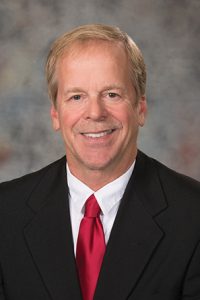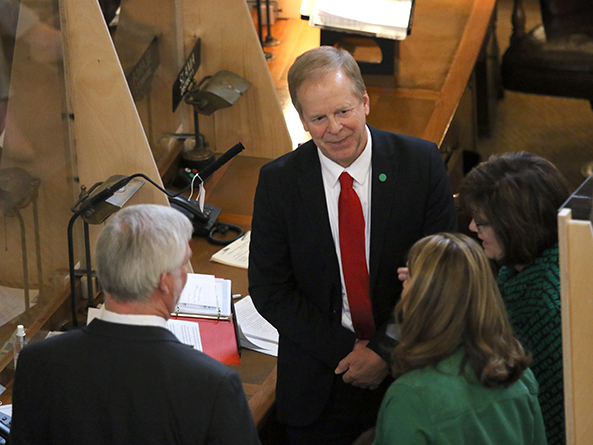Regulatory framework for racetrack casinos advanced
A bill that would implement provisions of a constitutional amendment approved in 2020 was expanded and advanced from general file March 17.

Last November, Nebraska voters legalized all forms of games of chance at licensed racetracks through an initiative petition drive. LB561, as introduced by Sen. Tom Briese of Albion, would provide the regulatory framework necessary to implement that constitutional amendment.
A General Affairs Committee amendment would have replaced the bill and added LB560, also introduced by Briese, as well as other provisions. At the request of Kearney Sen. John Lowe, the committee amendment was divided into three components and debated separately.
One component of the divided amendment, adopted 35-4, added the provisions of LB560 and also amended provisions of the original bill. The amendment would rename the State Racing Commission to the State Racing and Gaming Commission and grant it authority to regulate games of chance under the Nebraska Racetrack Gaming Act.
Among other provisions, the amendment also would:
• raise the legal age for wagering on horse racing from 19 to 21;
• establish a process to allow an individual to be excluded voluntarily from wagering;
• establish a system for lodging complaints;
• classify manipulation of a game of chance or gaming machine as a Class I misdemeanor; and
• allow the commission to hire investigators, inspectors and other personnel necessary to administer and enforce all provisions of the Nebraska Racetrack Gaming Act.
Debate focused on the other two components of the original committee amendment. One of those, adopted 31-10, would authorize sports wagering in designated areas at Nebraska racetrack casinos and grant authority to the State Racing and Gaming Commission to adopt and enforce rules.
Under the amendment, in-person wagers could be placed on professional, collegiate and international sports but not on interscholastic, youth, minor league or fantasy sports. Wagers on the performance or nonperformance of an individual athlete in a collegiate sporting event involving a Nebraska team also would be excluded.
Briese said Nebraska voters delivered a clear mandate to allow gaming at racetracks, including sports wagering, and said the amended bill would implement that decision within established parameters.
“We owe it to the voters to get this in place in a timely manner,” he said. “When 70-plus percent of Nebraska voters approved games of chance they approved sports betting, period.”
Sen. Justin Wayne of Omaha supported the amendment. He said the ballot initiatives were self-enacting, meaning that sports betting is legal in Nebraska regardless of whether the Legislature takes action.
“Casinos will be built,” Wayne said. “If you don’t like gambling, which some of you don’t — clearly — you need to vote for this amendment or you’re going to open up sports betting wider than it’s ever been interpreted.”
Lowe disagreed, saying that Nebraskans didn’t intend to allow sports wagering when they voted to legalize gaming at racetracks. Games of chance, he said, include things like card games and lotteries but not sports wagering.
Thurston Sen. Joni Albrecht also opposed the proposal, saying that even backers of the gaming initiatives specifically stated that sports wagering would not be included in authorized casinos.
“If they say [sports wagering] was not part of the casino gambling aspect of it, I guess I don’t understand why we would just arbitrarily decide to put it in the bill,” Albrecht said.
A third component of the divided amendment would allow individuals to play keno on an electronic ticket purchased at a licensed lottery operator. Currently, keno tickets must be purchased on a paper ticket with cash. The amendment would allow purchase with an app or debit card linked to a bank account. Credit card payments would be prohibited.
Omaha Sen. John Cavanaugh said the change would allow keno operators to remain competitive once racetrack casinos are established.
Sen. Carol Blood of Bellevue supported the amendment, saying that keno proceeds generate revenue that cities rely on for community improvement projects.
“I’m not a big fan of gambling, but I am a big fan of community betterment funds,” Blood said.
Sen. Lou Ann Linehan of Elkhorn also supported the amendment despite her opposition to gambling. She said she voted against the ballot initiatives but acknowledged that opponents “lost big” and said senators now should implement the will of the people.
Albrecht opposed the amendment, saying that its provisions were not part of the underlying bill and had not had a public hearing. In addition, she said, electronic tickets would speed up the game.
“It allows people to spend their money quicker,” Albrecht said. “[They] could possibly lose a job because of it, could possibly lose a marriage because of it, could possibly not be able to feed their children because of it.”
Briese assured lawmakers that the General Affairs Committee would hold a hearing on the amendment if it became part of LB561. Senators voted 26-18 to adopt the amendment.
After several hours of debate, the bill advanced to select file on a vote of 37-5.


